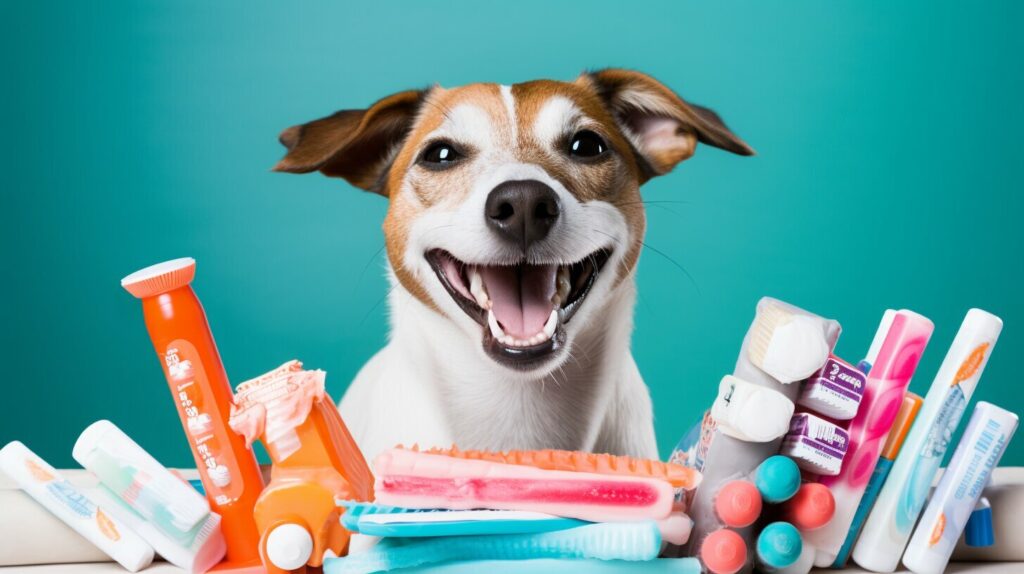If you’re a dog owner, you know that taking care of your furry friend’s health is of the utmost importance. While many pet parents focus on providing a nutritious diet and regular exercise, it’s also crucial to pay attention to your dog’s oral health. One of the most effective ways to ensure your dog has a healthy mouth is by brushing their teeth regularly with the best toothpaste for dogs!
Dental care for dogs is just as important as it is for humans. Poor oral health can lead to various health issues in dogs, such as gum disease and tooth decay. That’s why using specially formulated toothpaste for dogs is essential. Not only does it help keep their teeth clean and free from plaque and tartar, but it also freshens their breath and promotes healthy gums.
If you’re not sure which toothpaste to choose or how to get started with dental care for your dog, this article is for you! We’ll cover everything you need to know to keep your dog’s teeth and gums healthy, from understanding the benefits of using the best toothpaste for dogs to tips for overcoming dental care challenges.
Key Takeaways:
- Oral health is crucial for dogs, and regular brushing with toothpaste for dogs is an effective way to ensure good dental hygiene.
- Using specially formulated toothpaste for dogs has numerous benefits, including fresher breath, cleaner teeth, and healthier gums.
- In this article, we’ll cover everything you need to know about dental care for dogs, including choosing the best toothpaste, understanding ingredients, and tips for proper brushing.
Why is Dental Hygiene Important for Dogs?
Just like humans, dogs also need proper dental care to maintain good health. Dental hygiene for dogs includes a combination of regular teeth cleaning and using the right dog toothpaste. Neglecting dental care can lead to various dental issues, including gum disease, tooth decay, and bad breath.
Dogs’ teeth also accumulate plaque and tartar, which can cause inflammation and infections. Dental hygiene for dogs is crucial not just for their dental health but also for their overall well-being. Poor dental hygiene can cause pain, discomfort, and even lead to more severe health conditions.
Regular dog teeth cleaning is essential to prevent dental issues. Brushing your dog’s teeth regularly helps eliminate plaque and tartar buildup and prevents gum disease. Daily or weekly brushing, depending on your dog’s breed and age, is the best way to maintain dental hygiene. The right dog toothpaste can also make brushing easier and more efficient.
Understanding Dog Toothpaste Ingredients
Just like with human toothpaste, ingredients in dog toothpaste serve different purposes. Understanding what these ingredients are and their role in maintaining canine dental hygiene is crucial.
It is advisable to opt for natural dog toothpaste as it ensures the absence of harmful chemicals that could be detrimental to your pet’s health.
| Ingredient | Purpose |
|---|---|
| Enzymes | Help break down plaque and tartar. |
| Stevia | Acts as a natural sweetener to improve taste and encourage dogs to enjoy tooth brushing. |
| Baking soda | Neutralizes harmful acids, reduces odors, whitens teeth, and helps eliminate bacteria. |
| Chlorhexidine Gluconate | Effective antibacterial agent that helps reduce bacteria and prevent plaque and tartar buildup. |
| Calendula extract | Has anti-inflammatory and antibacterial properties to help reduce bleeding gums and maintain good oral hygiene. |
When choosing a dog toothpaste, read the label carefully to ensure that the product contains safe, effective ingredients. Avoid products containing artificial flavors and colors.
Choosing the Best Toothpaste for Puppies
Just like adult dogs, puppies require regular dental care to promote good oral health. However, it’s important to choose a toothpaste that is specifically formulated for your puppy’s delicate teeth and gums.
When selecting toothpaste for puppies, it’s essential to opt for products that are safe and gentle. Look for dog dental products that have natural ingredients and avoid any products that contain chemicals or additives that could harm your puppy.
It’s also crucial to choose a toothpaste with a flavor that your puppy will enjoy. Since most puppies have a sweet tooth, it’s best to choose a toothpaste with a delicious flavor that will make brushing more enjoyable for your furry friend.
| Tip: | Start by introducing your puppy to the toothpaste gradually. Allow them to sniff and taste it before introducing the toothbrush. This will help them get used to the new flavor and texture of the toothpaste. |
|---|
Some of the best toothpaste for puppies include enzymatic toothpaste that contains enzymes that break down tartar and plaque. These toothpaste options can help prevent dental issues, such as gum disease and tooth decay, from a young age. Other options include toothpaste that contains natural ingredients like green tea extract and aloe vera that can help clean and soothe your puppy’s mouth.
Overall, choosing the best toothpaste for your puppy is essential to promote good oral health and keep dental issues at bay. Make sure to start dental care routines early and make them fun and enjoyable for your puppy. With the right toothpaste and techniques, you can ensure that your furry friend has a healthy and beautiful smile for life.
Evaluating Dog Toothpaste Brands
Choosing the best toothpaste for your dog can be a daunting task with so many options available. The key to selecting the right toothpaste is to evaluate the brands based on certain criteria and find the one that suits your dog’s needs.
Taste and texture
Most dogs have their preferences when it comes to taste and texture. Some love the taste of chicken-flavored toothpaste, while others prefer beef or peanut butter. Texture is also important as some dogs prefer a smooth consistency, while others like a gritty texture for better teeth cleaning. Consider trying a few different brands to find what your dog likes best.
Effectiveness
The effectiveness of a toothpaste is an important factor to consider. Look for a toothpaste that effectively cleans the teeth and gums, removes plaque, and prevents bad breath. Some brands offer additional benefits such as whitening or tartar control, so choose a toothpaste that addresses your dog’s specific needs.
Safety
When it comes to your dog’s health, safety is paramount. Look for toothpaste brands that use safe and natural ingredients, and avoid those that contain chemicals or additives that may be harmful to your dog. Always read the ingredient label before purchasing any dog toothpaste.
Reviews
Reading dog toothpaste reviews can help you make an informed decision. Look for feedback from pet owners who have used the product and see how their dogs responded. Honest reviews can provide valuable insights about a toothpaste brand and its effectiveness. Always consider the overall rating and the number of reviews to ensure an accurate representation.
By evaluating toothpaste brands based on taste and texture, effectiveness, safety, and reviews, you can find the best toothpaste for your dog’s dental needs. Remember that consistency is key in maintaining good dental hygiene, so make sure to brush your dog’s teeth regularly and effectively.
The Proper Technique for Brushing Your Dog’s Teeth
Regular dental care is crucial for your dog’s overall health. Brushing your dog’s teeth is an essential part of maintaining good dental hygiene, but it can be challenging if you’re not familiar with the proper technique. Follow these steps to make the process easier and more effective:
- Introduce the toothpaste: Start by introducing your dog to the toothpaste. Use a toothpaste formulated specifically for dogs, as human toothpaste can be harmful to dogs. Let your dog sniff the toothpaste and taste a small amount to get used to the flavor.
- Brushing: Hold the toothbrush at a 45-degree angle to your dog’s teeth. Brush gently in circular motions, focusing on the gum line where plaque and tartar tend to build up. Be sure to brush the back teeth, where dental problems are most common. Brush for at least two minutes, twice a week.
- Reward: After brushing, reward your dog with praise and a treat. This will help your dog associate teeth brushing with positive experiences and make the process more enjoyable for both of you.
Remember to start the dental care routine early, ideally when your dog is a puppy. This will help your dog get used to the process and make it easier as they grow older. Be patient, consistent, and gentle with your dog during dental care routines, and don’t hesitate to ask for professional help if necessary.
Additional Tips:
- Use a soft-bristled toothbrush designed specifically for dogs. You can also use a finger brush if your dog is more comfortable with it.
- Choose a toothpaste with a flavor your dog likes, such as chicken or peanut butter.
- Make sure to rinse your dog’s toothbrush thoroughly after each use and replace it every three months or when the bristles become frayed.
Alternative Dental Care Options for Dogs
While regular brushing is crucial, there are other dental care options available to help maintain your dog’s oral health. These options can be used in conjunction with regular brushing to maximize the benefits of your dog’s dental care routine.
Dental Chews
Dental chews are a popular option for many dog owners. They are specially designed to help remove plaque and tartar buildup while also freshening your dog’s breath. They come in a variety of shapes and sizes, so it’s essential to choose the appropriate one for your dog’s size and age.
When choosing a dental chew, look for those that are made from high-quality ingredients and are low in calories. Some dental chews also contain natural enzymes that help break down plaque and freshen breath.
Oral Rinses
Oral rinses are another alternative to traditional brushing. They work by killing bacteria and freshening breath. Some oral rinses are also formulated to reduce plaque and tartar buildup.
When choosing an oral rinse, make sure it is safe for dogs and does not contain any harmful chemicals. Follow the instructions carefully and use the recommended amount.
Dental Wipes
Dental wipes are a convenient option for dogs who do not like to have their teeth brushed. They are also useful for cleaning the hard-to-reach areas of your dog’s mouth. Dental wipes are pre-moistened and can be used daily to remove plaque and freshen breath.
When using dental wipes, make sure to use a wipe specifically formulated for dogs. Do not use human dental wipes, as they may contain harmful ingredients that could be toxic to your dog.
By incorporating these alternative dental care options into your dog’s routine, you can help maintain their oral health and prevent dental issues.
Tips for Overcoming Dental Care Challenges in Dogs
Dogs may resist having their teeth brushed, making dental hygiene challenging for their owners. However, proper dental care is crucial for your dog’s overall health. Here are some tips to help you overcome dental care challenges:
- Be Patient: It may take some time for your dog to get used to the idea of having their teeth brushed. Start by introducing the toothbrush slowly, allowing them to sniff and explore it before attempting to brush their teeth.
- Use Positive Reinforcement: Reward your dog with praise, treats, or playtime after each successful brushing session. This will help them associate teeth brushing with positive experiences.
- Choose the Right Toothpaste: Pick a toothpaste that your dog enjoys the taste of. Some dog toothpaste comes in flavors that dogs love, such as chicken or beef. This will make the experience more enjoyable for your dog and easier for you.
- Make it Fun: Turn teeth brushing into a game or bonding experience. Use toys or treats to distract and engage your dog while brushing their teeth.
- Consider Professional Help: If your dog consistently resists dental care, consider seeking help from a professional dog trainer or veterinarian. They may be able to offer additional tips and guidance for overcoming dental care challenges.
Remember, consistency is key when it comes to dental care for dogs. With patience and persistence, you can overcome dental care challenges and help maintain your dog’s dental hygiene for a healthier and happier life.
Maintaining Your Dog’s Dental Health
Regular dental check-ups and professional cleanings are important for maintaining your dog’s dental hygiene. The frequency of these check-ups should be based on your dog’s breed and age, and your vet can provide guidance on scheduling.
During a dental check-up, your vet will examine your dog’s teeth and gums for signs of disease or decay. They may also recommend a professional cleaning if necessary, which involves removing plaque and tartar build-up from the teeth and gum line.
In addition to regular check-ups, it’s important to establish a consistent teeth cleaning routine at home. This can include brushing your dog’s teeth regularly with a toothpaste specifically formulated for dogs, using dental chews and rinses, or incorporating dental wipes into your routine.
Consistency is key to maintaining your dog’s dental health and preventing dental diseases. By taking proactive steps to care for your dog’s teeth, you can help ensure that they have a happy, healthy smile for years to come.
Conclusion
Investing in your dog’s dental health is an investment in their overall well-being. Regular dental care and the use of the best toothpaste for dogs can prevent dental diseases and maintain fresh breath. Remember to brush your dog’s teeth with a suitable toothpaste, consider alternative dental care options, and schedule regular check-ups with a veterinarian.
Don’t let dental care become a challenge between you and your furry friend. Be patient, consistent, and make it a positive experience for them. A healthy smile leads to a happier, healthier life for your beloved pet. Start today by choosing the best toothpaste for dogs and establishing a dental hygiene routine that works for you and your pup.
FAQ
Q: What is the best toothpaste for dogs?
A: The best toothpaste for dogs is one that is specifically formulated for their oral health needs. Look for toothpaste that is safe for dogs to swallow, has a flavor they enjoy, and contains beneficial ingredients to promote healthy teeth and gums.
Q: How often should I brush my dog’s teeth?
A: Ideally, you should brush your dog’s teeth every day. However, if that is not possible, aim for at least three times a week. Consistency is key to maintaining good dental hygiene in dogs.
Q: Can I use regular toothpaste on my dog?
A: No, you should never use regular human toothpaste on your dog. Human toothpaste contains ingredients that can be toxic to dogs if ingested. Use toothpaste that is specifically formulated for dogs to ensure their safety.
Q: How do I introduce toothpaste to my dog?
A: Start by letting your dog sniff and taste a small amount of toothpaste. Gradually introduce the toothbrush and gently brush their teeth, using positive reinforcement and treats to make the experience positive. Patience and consistency are key.
Q: Are there alternatives to brushing for dog dental care?
A: Yes, there are alternative dental care options for dogs. Dental chews, oral rinses, and dental wipes can help supplement regular brushing. However, brushing is still the most effective method for maintaining proper dental hygiene in dogs.
Q: How often should I take my dog for a dental check-up?
A: It is recommended to take your dog for a dental check-up at least once a year. However, some breeds may require more frequent check-ups. Consult with your veterinarian to determine the appropriate schedule for your dog.
Q: What if my dog resists having their teeth brushed?
A: If your dog resists having their teeth brushed, try using a finger brush or dental wipes as an alternative. You can also consult with a professional dog trainer or veterinarian for tips on how to make the experience more comfortable for your dog.
Q: Can dental care improve my dog’s overall health?
A: Yes, dental care plays a crucial role in maintaining your dog’s overall health. Poor oral hygiene can lead to various health issues, including gum disease and heart problems. Taking care of your dog’s teeth can contribute to their overall well-being.
Q: Are there specific toothpaste options for puppies?
A: Yes, there are toothpaste options specifically formulated for puppies. These toothpastes have milder flavors and gentler formulations to accommodate a puppy’s needs. Start introducing toothpaste and dental care routines to puppies as early as possible.
Q: How do I choose the best toothpaste for my dog?
A: When choosing toothpaste for your dog, consider their specific oral health needs, flavor preferences, and any specific recommendations from your veterinarian. Additionally, reading reviews and researching different brands can help you make an informed decision.



